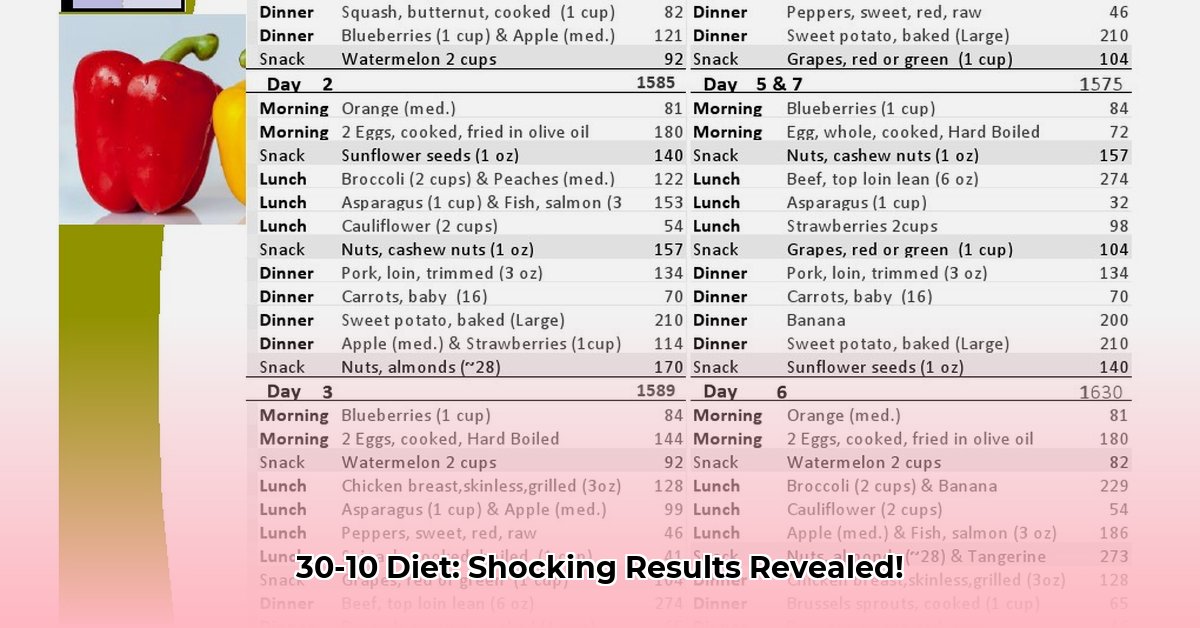
Thinking about the 30/10 Weight Loss for Life program? Its high cost and limited availability warrant careful consideration before enrollment. This review analyzes the program's effectiveness, cost, risks, and accessibility, offering actionable advice for potential clients.
Understanding the 30/10 Program
The 30/10 plan employs a very-low-calorie diet (VLCD) – a diet severely restricting calories (very low-calorie diet), typically characterized by high protein and very low carbohydrate intake – combined with coaching and behavioral modification techniques. While aiming for rapid weight loss, the program's long-term efficacy remains unsubstantiated. The high cost and limited geographic availability are significant drawbacks.
Effectiveness: Fact vs. Fiction
Numerous online testimonials claim significant weight loss. However, robust scientific evidence supporting the 30/10 program's specific approach is lacking. While VLCDs have some research support for short-term weight loss, the 30/10 program's unique combination of diet and support needs rigorous scientific validation. The program’s reliance on individual success stories, without robust scientific backing, raises concerns about the reliability of its advertised effectiveness. Isn't rigorous scientific evidence crucial for assessing the true effectiveness of any weight loss program?
Cost and Accessibility: A Significant Barrier
The 30/10 program carries a substantial financial burden, placing it out of reach for many. Its limited geographic reach, primarily in Washington State, further restricts access. This lack of widespread availability and transparency concerning pricing hinders informed decision-making.
Potential Risks and Benefits
VLCDs, including the 30/10 approach, carry inherent health risks. Rapid weight loss can lead to nutrient deficiencies, muscle loss, and other health complications. The program's exclusion of individuals with bipolar disorder necessitates further clarification regarding the underlying clinical rationale. Potential benefits, such as significant short-term weight loss (reported anecdotally), must be weighed against these potential risks. Doesn't the potential for significant health risks overshadow the reported short-term weight loss?
Pros:
- Potential for rapid initial weight loss (based on user reports).
- Structured program with coaching support.
Cons:
- Extremely high cost and limited geographic availability.
- Lack of strong scientific evidence supporting long-term effectiveness.
- Potential health risks associated with VLCDs.
- Lack of pricing transparency.
Actionable Advice
Consult a Healthcare Professional: Before starting any VLCD, consult a doctor or registered dietitian to assess its suitability and potential risks based on your individual health profile. This step is crucial for ensuring your safety and well-being.
Explore Alternatives: Numerous effective and affordable weight loss strategies exist, focusing on sustainable lifestyle changes like balanced nutrition and regular exercise. These methods prioritize long-term health and well-being, unlike quick-fix approaches.
Seek Independent Reviews: Don't solely rely on the program's marketing materials. Research independent and unbiased reviews from multiple sources to gain a comprehensive perspective. This approach is key to making an informed decision.
Prioritize Long-Term Sustainability: Rapid weight loss is often unsustainable. Sustainable lifestyle changes that include diet and regular exercise are more likely to produce long-lasting results. What good is rapid weight loss if it's not sustainable?
Conclusion: A Balanced Perspective
The 30/10 Weight Loss for Life program's effectiveness remains unproven due to a lack of scientific evidence. Its high cost and limited availability further restrict its accessibility. While some individuals report positive results, the potential health risks associated with VLCDs demand careful consideration. Before enrolling in the 30/10 program or any similar program, consult healthcare professionals and explore more affordable and sustainable alternatives. Remember, gradual, healthy weight loss is often more effective and safer in the long run.
Affordable Alternatives to the 30/10 Diet
The 30/10 diet's high cost and potential risks highlight the need for affordable and sustainable alternatives. Many effective methods achieve long-term weight management without the financial burden or health risks.
Exploring Budget-Friendly Options
Balanced Nutrition: A diet rich in fruits, vegetables, whole grains, and lean protein is fundamental for weight management and is budget-friendly. Meal planning reduces food waste and promotes healthy eating habits. How much can you save by reducing food waste alone?
Increased Physical Activity: Regular exercise is crucial, and many options are free or low-cost. Walking, jogging, or cycling are effective and require no gym memberships. Integrating more movement into your daily routine can significantly impact your overall fitness level.
Support Systems: While paid coaching is helpful for some, free online resources from reputable health organizations offer valuable guidance and community support. Connecting with supportive friends or family can boost motivation. What is the true value of a supportive community in achieving weight loss goals?
Prioritize Mental Well-being: Stress and emotional eating hinder weight loss. Cost-effective stress-reducing techniques like yoga, meditation, or spending time in nature can greatly improve mental health and aid in weight management. How much can you improve the success of your weight loss journey by managing stress?
Cost Comparison: 30/10 vs. Alternatives
| Program Type | Cost | Pros | Cons |
|---|---|---|---|
| 30/10 Diet | High (thousands of dollars) | Potential for rapid initial weight loss (potentially) | Unsustainable, expensive, potential health risks |
| Balanced Diet & Exercise | Low (primarily grocery cost) | Sustainable, healthy, affordable, improves overall well-being | Requires self-discipline, slower initial weight loss |
| Free Online Resources & Support | Free | Accessible, informative, community support | Requires self-motivation, lacks personalized guidance |
| Professional Guidance (Dietitian) | Moderate to High (varies) | Personalized plans, expert advice, accountability | Requires financial resources and finding a qualified practitioner |
The best approach depends on individual needs and preferences. Remember, sustainable weight loss is a journey, not a race.